人教版高中英语必修五 Unit1 Language points 名师课件(共64张PPT)
文档属性
| 名称 | 人教版高中英语必修五 Unit1 Language points 名师课件(共64张PPT) |
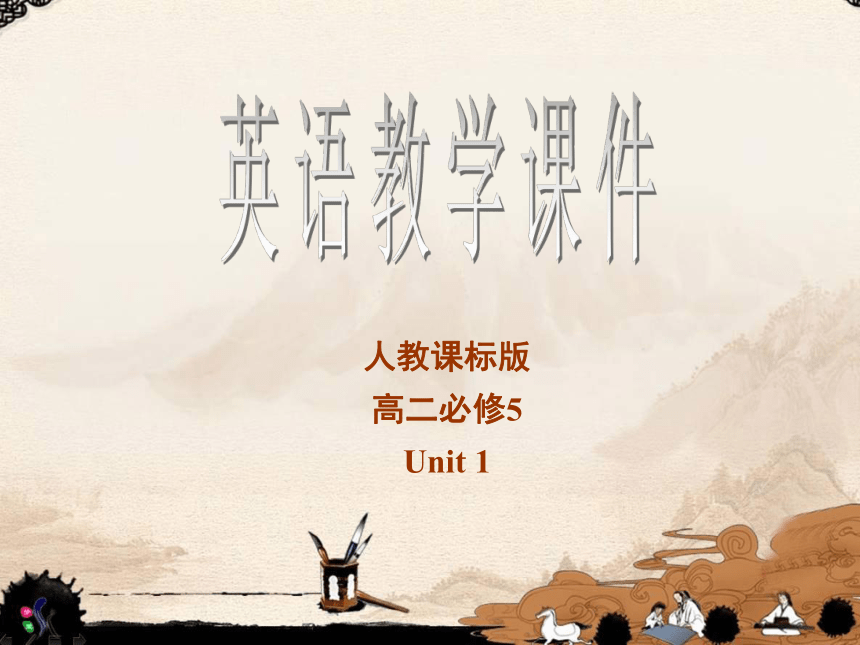
|
|
| 格式 | zip | ||
| 文件大小 | 1.0MB | ||
| 资源类型 | 教案 | ||
| 版本资源 | 人教版(新课程标准) | ||
| 科目 | 英语 | ||
| 更新时间 | 2015-03-11 00:00:00 | ||
图片预览

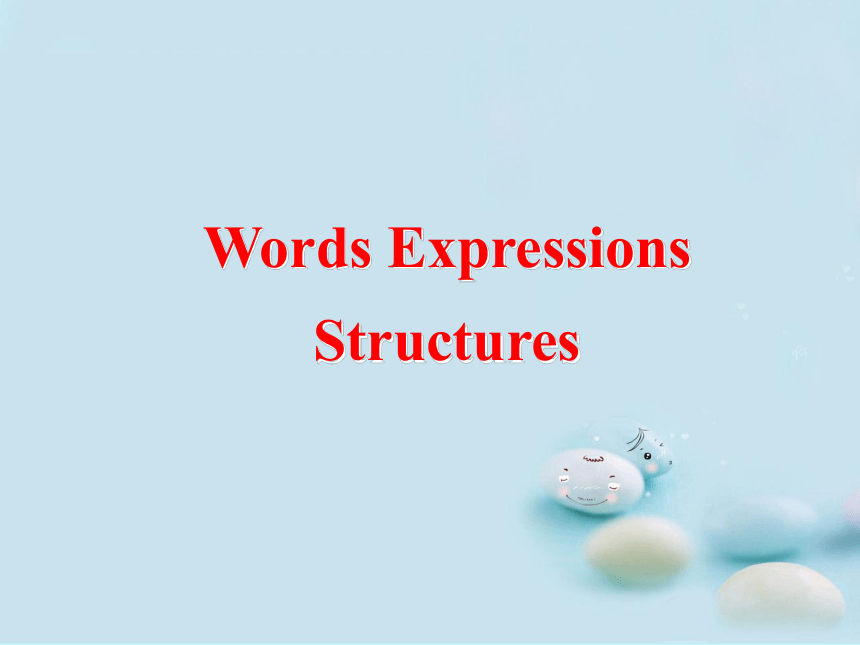
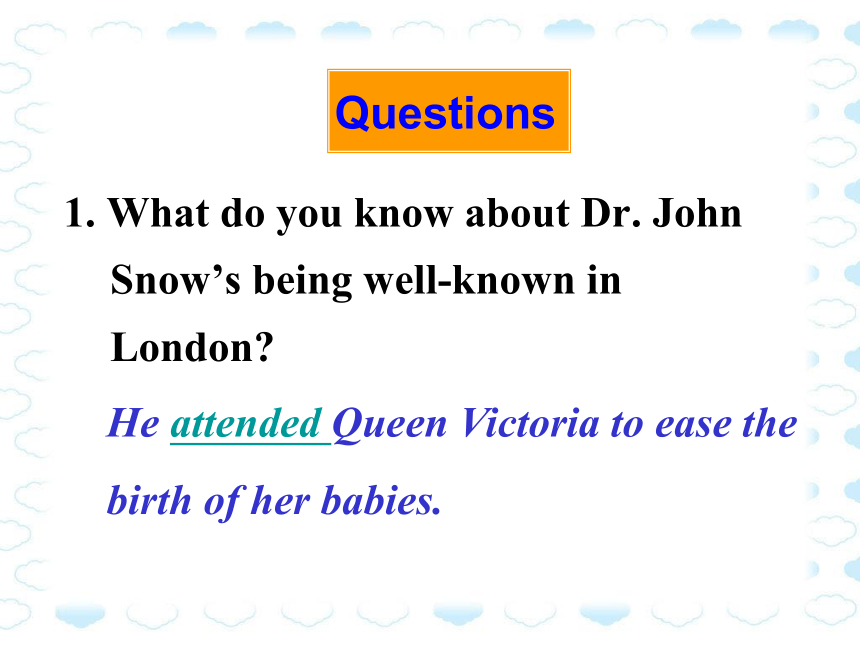
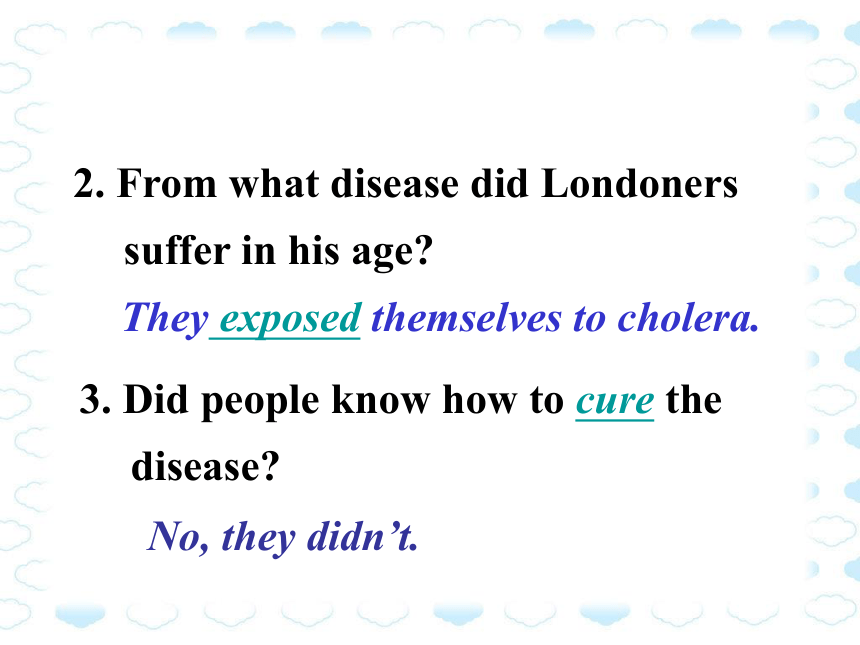
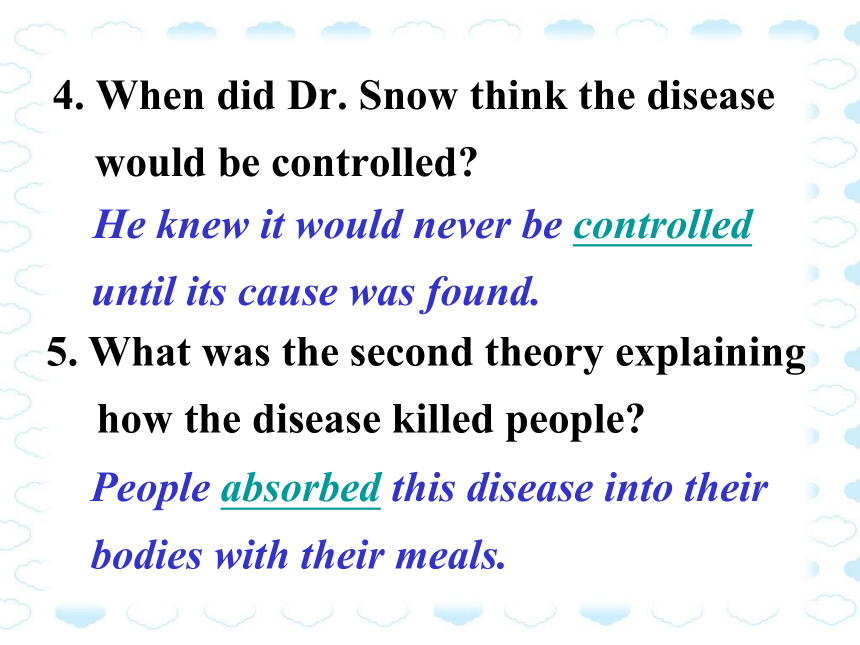
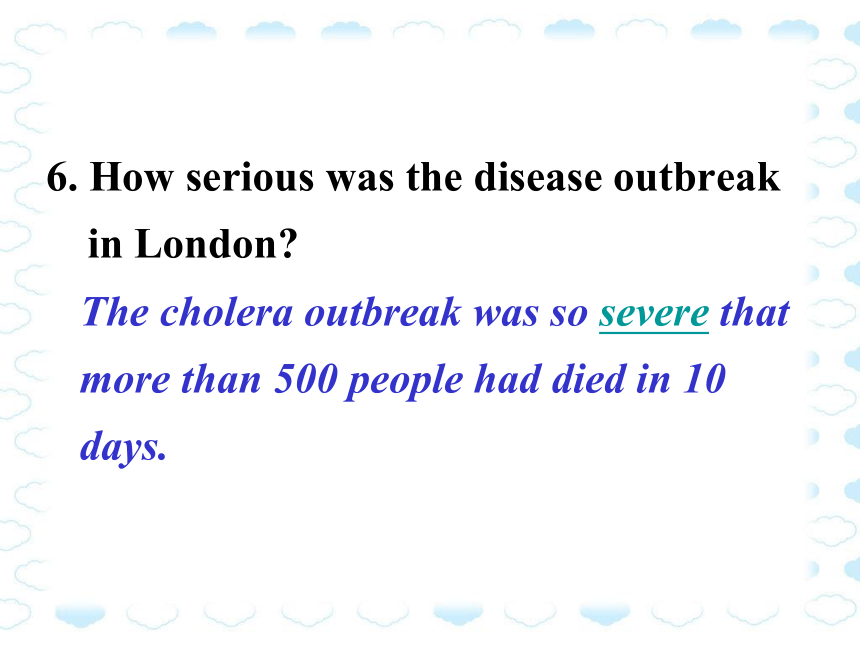
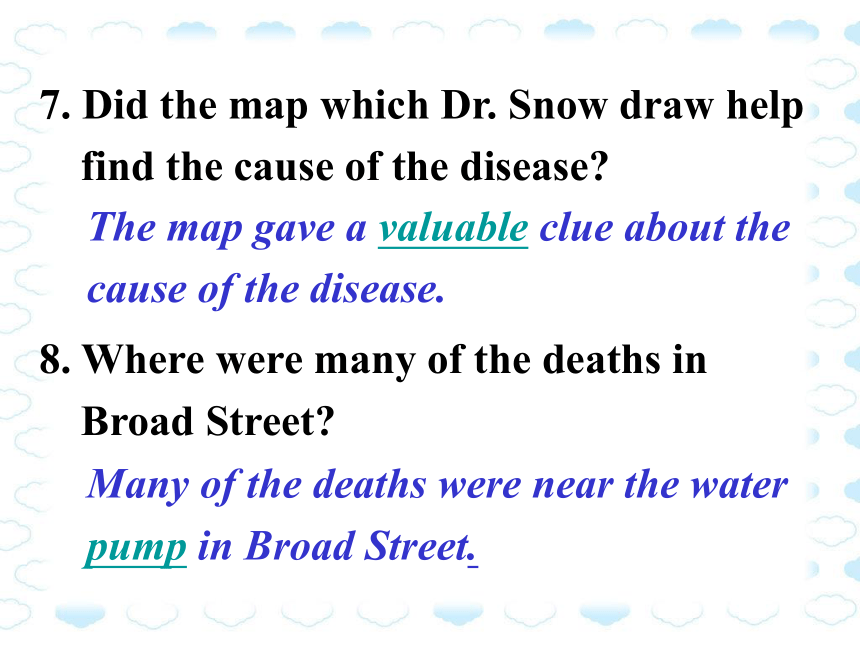
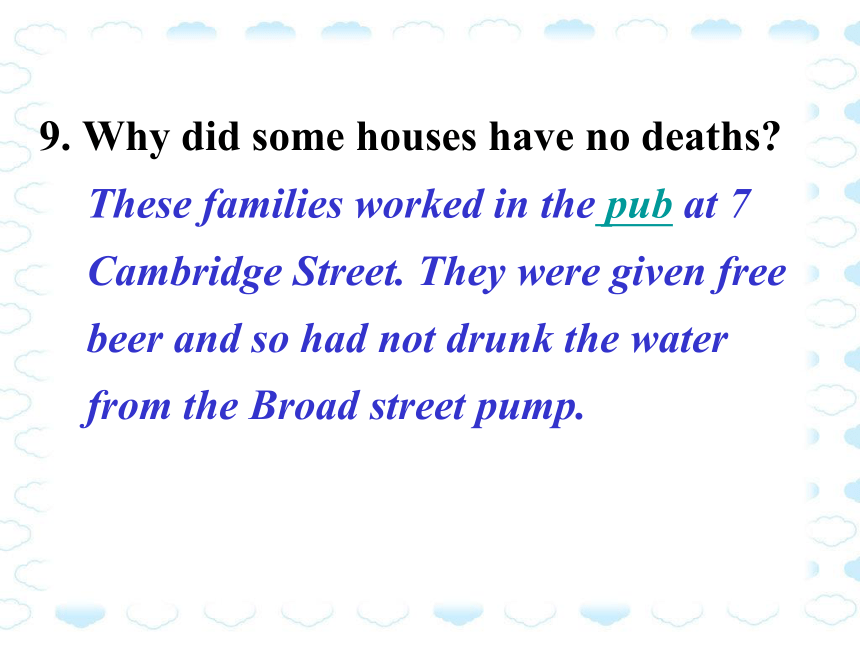
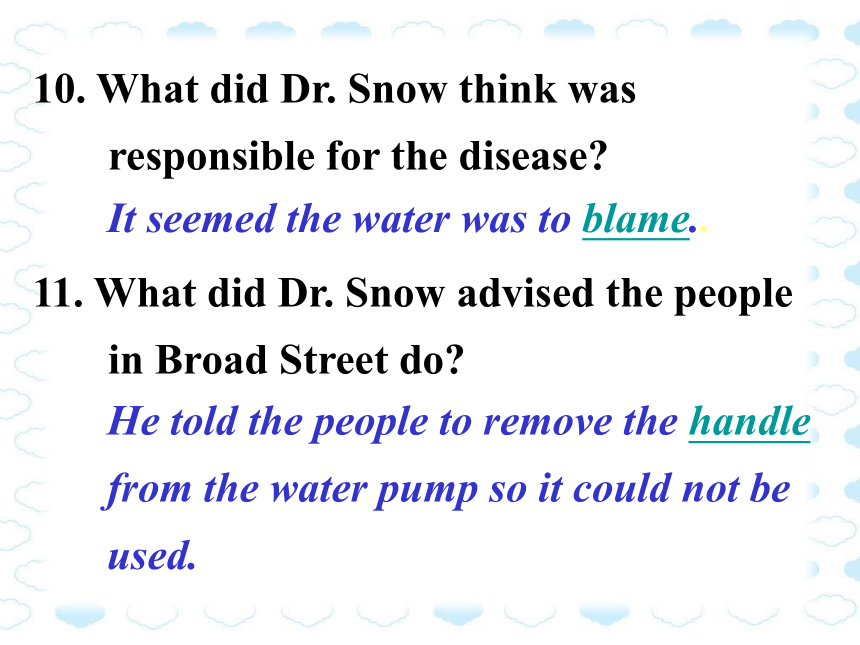
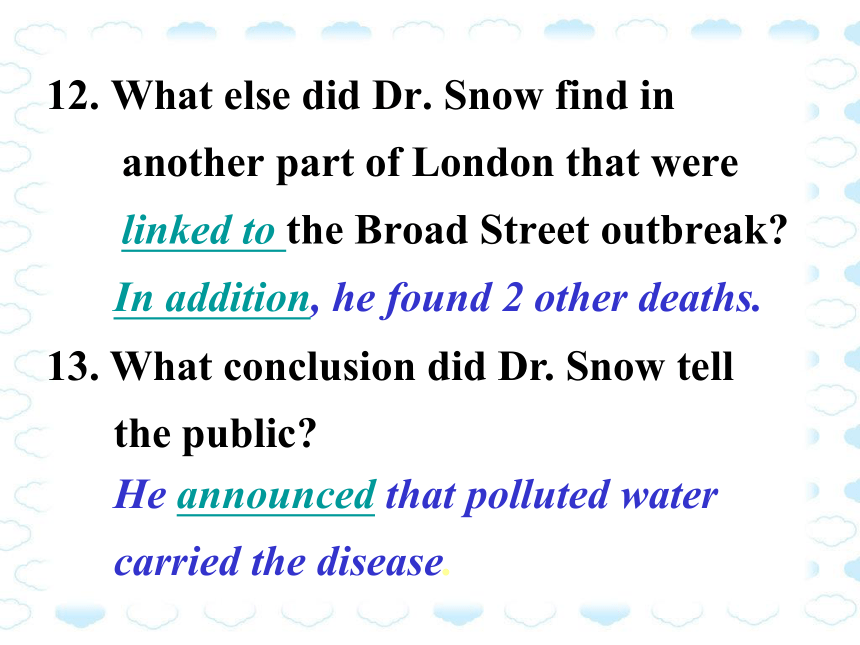
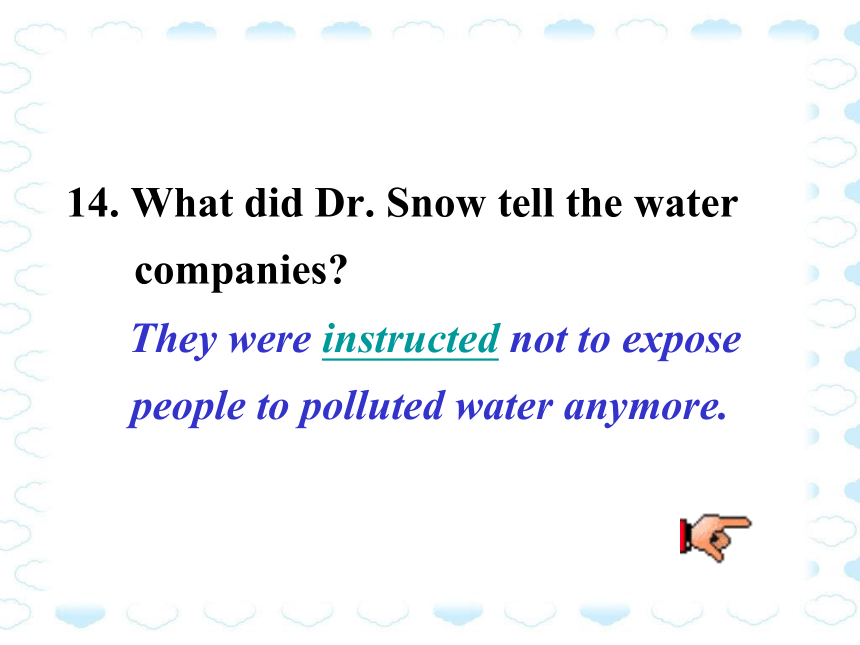
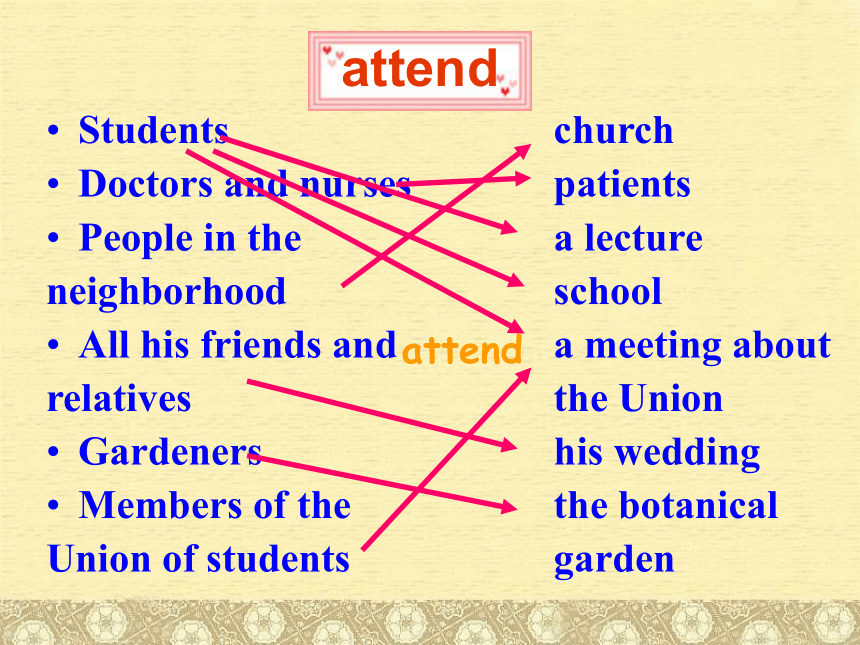
文档简介
课件64张PPT。人教课标版
高二必修5 Unit 1英语教学课件Words Expressions Structures 1. What do you know about Dr. John Snow’s being well-known in London?He attended Queen Victoria to ease the
birth of her babies.Questions3. Did people know how to cure the disease?2. From what disease did Londoners suffer in his age?They exposed themselves to cholera.No, they didn’t. 4. When did Dr. Snow think the disease would be controlled? He knew it would never be controlled
until its cause was found. People absorbed this disease into their
bodies with their meals.5. What was the second theory explaining how the disease killed people?6. How serious was the disease outbreak in London?The cholera outbreak was so severe that
more than 500 people had died in 10
days.The map gave a valuable clue about the cause of the disease.7. Did the map which Dr. Snow draw help find the cause of the disease?Many of the deaths were near the water pump in Broad Street.8. Where were many of the deaths in Broad Street?9. Why did some houses have no deaths?These families worked in the pub at 7 Cambridge Street. They were given free beer and so had not drunk the water from the Broad street pump.It seemed the water was to blame..10. What did Dr. Snow think was responsible for the disease?He told the people to remove the handle from the water pump so it could not be used.11. What did Dr. Snow advised the people in Broad Street do?12. What else did Dr. Snow find in another part of London that were linked to the Broad Street outbreak? In addition, he found 2 other deaths.13. What conclusion did Dr. Snow tell the public? He announced that polluted water
carried the disease.14. What did Dr. Snow tell the water companies? They were instructed not to expose
people to polluted water anymore.Students
Doctors and nurses
People in the
neighborhood
All his friends and
relatives
Gardeners
Members of the
Union of studentschurch
patients
a lecture
school
a meeting about
the Union
his wedding
the botanical
gardenattendattend* I may be late – I have got one or two things to attend to.
* Mother had to attend to her sick son.e.g.: 1. The wolf opened its mouth
to ______ a row of sharp
teeth.2. Don’t ______ your skin to the sun; your skin will be hurt.exposeexposeexpose People in many provinces of China exposed themselves to the SARS in 2003. Meaning?“to show sth. that is usually covered;
to leave unprotected; to put sth.
in a harmful situation”eg: The police began to look into the case, but the eyewitness was afraid to _______ the murderer. Meaning?“to make known; to tell the truth”expose揭发* When you have a pain in your shoulders, you will go to see a doctor. The doctor will _____ you. He will ____ the pain in your shoulders. Aspirin is said to be a
wonderful _____ for the pain.curecurecurecurev. 治愈n. 疗法* Although the boy was beyond _____, his parents tried to ____ him of bad habits.
* The prices are going up every day, but there is no _____ for rising prices.curecurecure不可救药n. 对策The wound on my arm has healed.
He was healed of his sickness.healcontrolComplete the sentences in the first part with the words in the second part.
“control” will be used between the
2 parts.1. The Republican Party continued to ___.
2. The Ministry of Health has set up a program to ___.
3. Sarah just cannot ___.
4. The buttons ____ .BACDPart 1A. the spread of AIDS
B. the House (议院) of the USA
C. her temper
D. the temperature in the building Part 2Phrases of ‘control’soil
sponge
water
students
air
work / job
a big companysound
knowledge
heat
time
an article
a small company
the meaning (of a
remark)
waterabsorb—take in/understandbe absorbed in = concentrate on
eg. He is absorbed in the research of
Chinese history recently.
absorb one’s attention
eg. Chinese history absorbs his
attention recently.Severe Acute Respiratory Syndrome
严重急性呼吸道症候群
Q: Which of the following definitions is suitable for each sentence?Do you know the full name of SARS?severeA. unpleasant or dangerous weather
B. very strict
C. very bad or serious to worry about
D. extreme criticism or punishment1. He has such a severe illness that he has been in hospital.
2. I was caught in a severe storm last night and couldn’t go back home in time.
CA3. Come on! Don’t be so severe with the children.
4. His report contains severe criticism of the company’s actions.BD-- What is the value of this 18k white gold diamond necklace?
-- It cost me $2,000 (=It was worth $2,000.), but I valued the necklace at $1,000.
-- It was a valuable diamond necklace.valuablen. 价格v. 估价adj. 贵重的 [谚]井干方知水可贵。
We never know ___ ____ of water ___ __ ___ __ ___.
Q1: What’s the meaning of “value” when it is a noun or verb? What does “valuable” mean?the valuetill the well is dry* value (n.): the amount of money that sth. is worth
* value (vt.): to decide that how much sth. is worth
* valuable (adj.): worth a lot of moneyeg: The Longman Dictionary of
Contemporary English is of great value to
you.
His research has been of no / little
practical value.
I value your friendship very highly.
Q2: What is the meaning of “value” when it is a noun or a verb in the above sentences? value (n.): the importance or
usefulness of something 价值
* value (vt.): to think that something is important to you 珍重Q3: In the text, “The map gave a valuable clue about the cause of the disease.” does “valuable” means “worth a lot of money”?
* valuable (adj.): important because there
is only a limited amount
available泵 (油泵; 气泵), 抽水机, 打气筒pumpIf have a flat tyre, you will pump air into the tyre. (You will pump up your tyre.)
When my car was short of gas, I went to the gas station, where the guy pumped gas.pumpv. 打气v. 打气We had a debate yesterday. The lively debate really pumped us up.
His heart was pumping fast.
During the drought last year, the villagers had pumped the well dry, but got no more water.v. 给…打气v. 心跳v. 用唧筒抽(水等);用唧筒抽吸...中的水等 酒馆
bar旅馆;
小店pub, public houseblame sb. / sth. for… : to say or think
that sb. or sth. is responsible for sth.
bad
eg: It’s not fair to blame me. It’s not
my fault.
They blamed the secretary for the
delay of the plan.blame* be to blame: be responsible for sth. bad
eg. The driver was not to blame for the traffic accident. 应该负责
* take the blame: to say that sth. is your fault
eg. He is ready to take the blame for what had happened.handlehandle v.Choose the Chinese explanations in the box.1. Ms Hawkins, the chief accountant of the company handles the company's accounts.C2. The children are so naughty that I
can't handle them.
3. She handled a difficult argument
skillfully.FE4. Handle children kindly, if you want them to trust you.
5. This shop handles paper and stationery.
6. He learnt how to handle the axe.DBAin addition
also
as well as
besidesused when adding another
fact to what has already been
mentioned In addition to apples you asked for, I
bought you some oranges.In addition2. The two towns are linked
by a railway. v. 连接 1. A lot of links fitted together form a chain. n. (链状物的)环,节 3. The new bridge will link the island to the mainland.link4. 研究人员发现了吸烟和心脏病之间的关系。
Researchers have detected a link between smoking and heart disease.1. The captain announced that the plane was going to land.
2. The government announced that they would build a new highway to the mountain.
3. The army announced a cease-fire. announce4. It has been announced that Mr. A and Miss B will be married next week.
Meaning?
* to make known publicly; to give information using a loudspeaker, esp. at an airport or railway station5. The announcer announces three programs a week.
* to introduce a program on TV or radio* train approach announcement
* He waited for the announcement
of the result of the competition.
* make an announcementannouncement1. -- Who instructs your class in history?
-- Mr Black. He is our instructor.
2. She instructed me in the use of this telephone.
3. I've been instructed to wait here until the lecturer arrives.(to teach; to order)instructdetailed directions on procedure;
an order; teachinginstruction1. The boss gave me so many instructions at one time that I got muddled up. 指示
2. We forgot to read the instructions. (an instruction book) 使用说明
3. Under Berry’s instruction, I slowly mastered the art of glass blowing. 指导 Speak out the phrases with “make” according to the pictures or the Chinese definitions.交朋友make friends确保; 确定make sure下定决心make up one’s mind为...腾出空位make room formake a facemake the bed一路前进;向前make one’s way to用括号内所给词的适当形式填空。
1. These suggestions are very _________ (value) in your English studies.
2. The telephone rang, and he answered it ___________ (immediate).
3. In ________ (add) to English, he could also speak French.
4. He _________ (announcement) that he would give up the job soon.
5. The doctor __________ (instruct) him to go to bed and rest ten minutes ago.instructedvaluable immediatelyaddition announced 下列各句均有一处错误,请指出并改正。
1. At least 300 employing workers got involved in the strike.
2. I wrote suggesting that he came for the weekend.
3. Neither I nor my wife understand what little Tracy is saying now.
4. He is too fat that he couldn’t get through the door.
5. The next five months will examine your powers of leadership.employedcomeunderstandssotest根据括号内的提示将下列句子翻译成英语。1. 如果有人该承担责任, 那就是我。(blame)
2. 不要把皮肤直接暴露在阳光下。(expose ... to)If anyone’s to blame, it’s me.Don’t expose your skin to sunlight directly.3. 黑色墙壁在白天吸收大量的热。(absorb)
4. 此外, 你还可以利用业余时间学一门外语。 (in addition)Black walls absorb a lot of heat during the day.In addition, you can learn a foreign language in your spare time.5. 这条丝绸之路在古代把中国和西方连接起来。 (link ... to)
6. 这种疾病就是通过咳嗽传播的。 (spread ... through)The Silk Road linked China to the west in ancient times.The disease is spread through coughing.7. 他看到他父亲时很吃惊。(过去分词作表语)
8. 我每天早上吃一个煎鸡蛋。(过去分词作定语)
He was astonished to see his father.I have a fried egg every morning.9. 我们决定马上离开。(determine to)
10. 我无意暗示你错了。(suggest)I don’t wish to suggest that you’re wrong.We determined to leave at once.
高二必修5 Unit 1英语教学课件Words Expressions Structures 1. What do you know about Dr. John Snow’s being well-known in London?He attended Queen Victoria to ease the
birth of her babies.Questions3. Did people know how to cure the disease?2. From what disease did Londoners suffer in his age?They exposed themselves to cholera.No, they didn’t. 4. When did Dr. Snow think the disease would be controlled? He knew it would never be controlled
until its cause was found. People absorbed this disease into their
bodies with their meals.5. What was the second theory explaining how the disease killed people?6. How serious was the disease outbreak in London?The cholera outbreak was so severe that
more than 500 people had died in 10
days.The map gave a valuable clue about the cause of the disease.7. Did the map which Dr. Snow draw help find the cause of the disease?Many of the deaths were near the water pump in Broad Street.8. Where were many of the deaths in Broad Street?9. Why did some houses have no deaths?These families worked in the pub at 7 Cambridge Street. They were given free beer and so had not drunk the water from the Broad street pump.It seemed the water was to blame..10. What did Dr. Snow think was responsible for the disease?He told the people to remove the handle from the water pump so it could not be used.11. What did Dr. Snow advised the people in Broad Street do?12. What else did Dr. Snow find in another part of London that were linked to the Broad Street outbreak? In addition, he found 2 other deaths.13. What conclusion did Dr. Snow tell the public? He announced that polluted water
carried the disease.14. What did Dr. Snow tell the water companies? They were instructed not to expose
people to polluted water anymore.Students
Doctors and nurses
People in the
neighborhood
All his friends and
relatives
Gardeners
Members of the
Union of studentschurch
patients
a lecture
school
a meeting about
the Union
his wedding
the botanical
gardenattendattend* I may be late – I have got one or two things to attend to.
* Mother had to attend to her sick son.e.g.: 1. The wolf opened its mouth
to ______ a row of sharp
teeth.2. Don’t ______ your skin to the sun; your skin will be hurt.exposeexposeexpose People in many provinces of China exposed themselves to the SARS in 2003. Meaning?“to show sth. that is usually covered;
to leave unprotected; to put sth.
in a harmful situation”eg: The police began to look into the case, but the eyewitness was afraid to _______ the murderer. Meaning?“to make known; to tell the truth”expose揭发* When you have a pain in your shoulders, you will go to see a doctor. The doctor will _____ you. He will ____ the pain in your shoulders. Aspirin is said to be a
wonderful _____ for the pain.curecurecurecurev. 治愈n. 疗法* Although the boy was beyond _____, his parents tried to ____ him of bad habits.
* The prices are going up every day, but there is no _____ for rising prices.curecurecure不可救药n. 对策The wound on my arm has healed.
He was healed of his sickness.healcontrolComplete the sentences in the first part with the words in the second part.
“control” will be used between the
2 parts.1. The Republican Party continued to ___.
2. The Ministry of Health has set up a program to ___.
3. Sarah just cannot ___.
4. The buttons ____ .BACDPart 1A. the spread of AIDS
B. the House (议院) of the USA
C. her temper
D. the temperature in the building Part 2Phrases of ‘control’soil
sponge
water
students
air
work / job
a big companysound
knowledge
heat
time
an article
a small company
the meaning (of a
remark)
waterabsorb—take in/understandbe absorbed in = concentrate on
eg. He is absorbed in the research of
Chinese history recently.
absorb one’s attention
eg. Chinese history absorbs his
attention recently.Severe Acute Respiratory Syndrome
严重急性呼吸道症候群
Q: Which of the following definitions is suitable for each sentence?Do you know the full name of SARS?severeA. unpleasant or dangerous weather
B. very strict
C. very bad or serious to worry about
D. extreme criticism or punishment1. He has such a severe illness that he has been in hospital.
2. I was caught in a severe storm last night and couldn’t go back home in time.
CA3. Come on! Don’t be so severe with the children.
4. His report contains severe criticism of the company’s actions.BD-- What is the value of this 18k white gold diamond necklace?
-- It cost me $2,000 (=It was worth $2,000.), but I valued the necklace at $1,000.
-- It was a valuable diamond necklace.valuablen. 价格v. 估价adj. 贵重的 [谚]井干方知水可贵。
We never know ___ ____ of water ___ __ ___ __ ___.
Q1: What’s the meaning of “value” when it is a noun or verb? What does “valuable” mean?the valuetill the well is dry* value (n.): the amount of money that sth. is worth
* value (vt.): to decide that how much sth. is worth
* valuable (adj.): worth a lot of moneyeg: The Longman Dictionary of
Contemporary English is of great value to
you.
His research has been of no / little
practical value.
I value your friendship very highly.
Q2: What is the meaning of “value” when it is a noun or a verb in the above sentences? value (n.): the importance or
usefulness of something 价值
* value (vt.): to think that something is important to you 珍重Q3: In the text, “The map gave a valuable clue about the cause of the disease.” does “valuable” means “worth a lot of money”?
* valuable (adj.): important because there
is only a limited amount
available泵 (油泵; 气泵), 抽水机, 打气筒pumpIf have a flat tyre, you will pump air into the tyre. (You will pump up your tyre.)
When my car was short of gas, I went to the gas station, where the guy pumped gas.pumpv. 打气v. 打气We had a debate yesterday. The lively debate really pumped us up.
His heart was pumping fast.
During the drought last year, the villagers had pumped the well dry, but got no more water.v. 给…打气v. 心跳v. 用唧筒抽(水等);用唧筒抽吸...中的水等 酒馆
bar旅馆;
小店pub, public houseblame sb. / sth. for… : to say or think
that sb. or sth. is responsible for sth.
bad
eg: It’s not fair to blame me. It’s not
my fault.
They blamed the secretary for the
delay of the plan.blame* be to blame: be responsible for sth. bad
eg. The driver was not to blame for the traffic accident. 应该负责
* take the blame: to say that sth. is your fault
eg. He is ready to take the blame for what had happened.handlehandle v.Choose the Chinese explanations in the box.1. Ms Hawkins, the chief accountant of the company handles the company's accounts.C2. The children are so naughty that I
can't handle them.
3. She handled a difficult argument
skillfully.FE4. Handle children kindly, if you want them to trust you.
5. This shop handles paper and stationery.
6. He learnt how to handle the axe.DBAin addition
also
as well as
besidesused when adding another
fact to what has already been
mentioned In addition to apples you asked for, I
bought you some oranges.In addition2. The two towns are linked
by a railway. v. 连接 1. A lot of links fitted together form a chain. n. (链状物的)环,节 3. The new bridge will link the island to the mainland.link4. 研究人员发现了吸烟和心脏病之间的关系。
Researchers have detected a link between smoking and heart disease.1. The captain announced that the plane was going to land.
2. The government announced that they would build a new highway to the mountain.
3. The army announced a cease-fire. announce4. It has been announced that Mr. A and Miss B will be married next week.
Meaning?
* to make known publicly; to give information using a loudspeaker, esp. at an airport or railway station5. The announcer announces three programs a week.
* to introduce a program on TV or radio* train approach announcement
* He waited for the announcement
of the result of the competition.
* make an announcementannouncement1. -- Who instructs your class in history?
-- Mr Black. He is our instructor.
2. She instructed me in the use of this telephone.
3. I've been instructed to wait here until the lecturer arrives.(to teach; to order)instructdetailed directions on procedure;
an order; teachinginstruction1. The boss gave me so many instructions at one time that I got muddled up. 指示
2. We forgot to read the instructions. (an instruction book) 使用说明
3. Under Berry’s instruction, I slowly mastered the art of glass blowing. 指导 Speak out the phrases with “make” according to the pictures or the Chinese definitions.交朋友make friends确保; 确定make sure下定决心make up one’s mind为...腾出空位make room formake a facemake the bed一路前进;向前make one’s way to用括号内所给词的适当形式填空。
1. These suggestions are very _________ (value) in your English studies.
2. The telephone rang, and he answered it ___________ (immediate).
3. In ________ (add) to English, he could also speak French.
4. He _________ (announcement) that he would give up the job soon.
5. The doctor __________ (instruct) him to go to bed and rest ten minutes ago.instructedvaluable immediatelyaddition announced 下列各句均有一处错误,请指出并改正。
1. At least 300 employing workers got involved in the strike.
2. I wrote suggesting that he came for the weekend.
3. Neither I nor my wife understand what little Tracy is saying now.
4. He is too fat that he couldn’t get through the door.
5. The next five months will examine your powers of leadership.employedcomeunderstandssotest根据括号内的提示将下列句子翻译成英语。1. 如果有人该承担责任, 那就是我。(blame)
2. 不要把皮肤直接暴露在阳光下。(expose ... to)If anyone’s to blame, it’s me.Don’t expose your skin to sunlight directly.3. 黑色墙壁在白天吸收大量的热。(absorb)
4. 此外, 你还可以利用业余时间学一门外语。 (in addition)Black walls absorb a lot of heat during the day.In addition, you can learn a foreign language in your spare time.5. 这条丝绸之路在古代把中国和西方连接起来。 (link ... to)
6. 这种疾病就是通过咳嗽传播的。 (spread ... through)The Silk Road linked China to the west in ancient times.The disease is spread through coughing.7. 他看到他父亲时很吃惊。(过去分词作表语)
8. 我每天早上吃一个煎鸡蛋。(过去分词作定语)
He was astonished to see his father.I have a fried egg every morning.9. 我们决定马上离开。(determine to)
10. 我无意暗示你错了。(suggest)I don’t wish to suggest that you’re wrong.We determined to leave at once.
